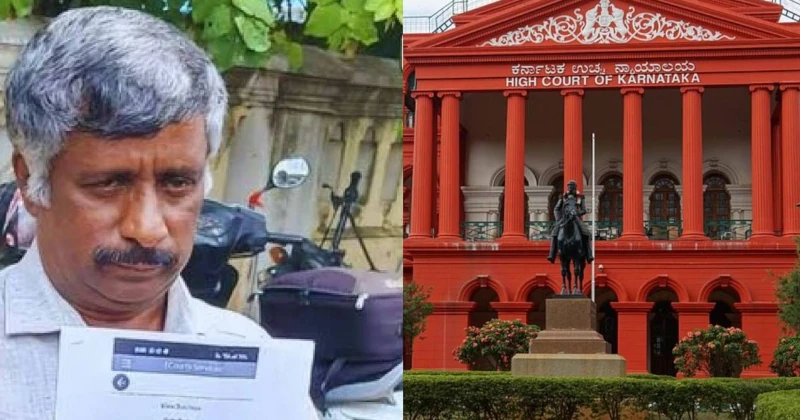
In the heart of Mysore, a city steeped in history and politics, a battle raged beneath the surface that pitted a fearless social activist against powerful bureaucrats and law enforcement. Snehamayi Krishna, an outspoken Right to Information (RTI) worker and social reformer, found himself ensnared in a complex web of accusations and legal troubles that seemed to be orchestrated by those in power. Krishna is the MUDA land scam complainant, of which CM Siddaramaiah is accused.
On December 17, Krishna made headlines when he publicly alleged that police officers in Mysore were behind a false complaint filed against him for “obstructing duty.” This complaint, he asserted, was nothing more than a malicious attempt to silence his ongoing efforts to expose corruption surrounding the notorious Muda scam and a shocking case involving the theft of sacred sarees from Chamundi Hills. The allegations ignited a firestorm of debate about the complicity of local authorities in stifling dissent and protecting vested interests.

Krishna’s claims were validated when the High Court intervened, issuing a stay on the case registered at the KR Police Station concerning the obstructing duty charge. Speaking to journalists, Krishna expressed his outrage at what he described as blatant harassment by the authorities, vowing to continue his fight against corruption, even if it jeopardised his life. “They are out to suppress my struggle,” he declared, asserting that the local police acted on behalf of powerful politicians who felt threatened by his investigations.
At the centre of this escalating conflict was DCP Muthuraj, a figure Krishna accused of being a key player in the rampant criminality in Mysore. Krishna pointed out that while the Mysore Police Commissioner’s office was under surveillance through CCTV cameras, Muthuraj’s office lacked such oversight. “Why is there no CCTV in his room?” Krishna questioned.
He suggested that this absence was a deliberate choice to shield the DCP from scrutiny, casting doubt on the integrity of law enforcement in the region. The roots of Krishna’s battle with Mysore’s power structures can be traced back to his tireless efforts to expose the Muda scam—a significant corruption scandal involving the Mysore Urban Development Authority. Frustrated by the lack of action on his complaints, Krishna claimed to have escalated his concerns to the Director General of Police (DGP), only to be silent.
“No action was taken,” he lamented, “It was as if they wanted me to back down.” In his latest endeavour, Krishna brought to light a troubling situation involving sacred sarees that had been donated to the Chamundeshwari Temple but were found being sold at ridiculously low prices in a local market. Despite having gathered video evidence, he encountered significant pushback from law enforcement.
He recounted how he was taken to Chamundi Hills in an official police vehicle to investigate the matter, only to find his findings disregarded by the officers supposed to help him. “With every step forward, they try to pull me two steps back,” Krishna stated with exasperation. “The sub-inspector said an FIR should be filed, yet nothing came of it.
” This lack of action and the confusing statements from officials painted a disheartening picture of corruption intertwined with the fabric of local governance. The stakes grew higher as Krishna alleged that he was facing retaliation for his relentless pursuit of justice. Following a media interaction regarding the saree scandal, he was met with a formal complaint from DCP Muthuraj, further entrenching his belief that he was being targeted for his activism.
“He knew the complaint was false,” Krishna declared. “This was a calculated move to prevent me from exposing the truth.” Compounding his fears was an impending appearance in the High Court concerning a CBI application he had filed against the local government.
“I received information that they were going to file a false complaint against me, aiming to prevent me from attending the hearing,” he asserted. The complaint’s timing was suspicious, and Krishna believed it was a deliberate tactic to undermine his case. Despite the odds stacked against him, Krishna remained resolute.
He confided in his legal team and successfully filed an application that resulted in a favourable ruling from the High Court, which not only stayed the fabricated charges but also instructed an investigation into the sale of the sacred sarees. As news of Krishna’s plight spread, public sentiment began to shift. Citizens grew concerned about the implications of such governmental overreach, viewing it as an attack on transparency and accountability.
“Siddaramaiah, who is originally from Mysore, should be ashamed of the systematic harassment happening in his own district,” Krishna stated, alluding to the political climate that allowed such abuses to flourish. The activist’s plight did not go unnoticed by various human rights organisations. The day he spoke to the media, he confirmed that he had filed a complaint with the Human Rights Commission against DCP Muthuraj and requested his transfer to prevent any further manipulation of justice in Mysore.
Krishna’s actions underscored a growing movement calling for more robust protections for whistleblowers and activists in India. A group of activists planned a series of public demonstrations, demanding accountability from the police and the government. It became clear that this was not just a personal battle for Krishna but a fight for the MUDA land irregularities.
The actions of the police were scrutinised like never before as citizens began to question the motives behind the silence and inaction of their local leaders. Though the battle was far from over, Snehamayi Krishna stood poised to confront the storm ahead, armed with the resilience of conviction and the belief that the truth could ultimately prevail against the darkest shadows of corruption. In a world where the powerful often prey on the vulnerable, his voice echoed louder than ever, calling for justice and reform in the face of adversity.
“I will fight until justice is served, no matter the cost,” he vowed, a soldier of integrity on a battlefield of deceit..











